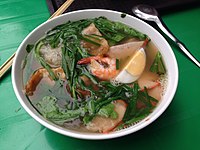Vietnamese cuisine/ja: Difference between revisions
Created page with "フカヒレはベトナムによって大量に輸入されている。" |
Created page with "アンソニー・ボーディン、トラベル・チャンネルの''アンソニー・ボーディン:ノー・リザベーションズ''のホストシェフは、2005年4月に「…すべてが使われ、ベトナムでは何も無駄にならない」と書いている。多くの西洋諸国ではしばしば処分される動物の部位も、ベトナム料理では完..." |
||
| Line 878: | Line 878: | ||
[[Shark fin soup/ja|フカヒレ]]はベトナムによって大量に輸入されている。 | [[Shark fin soup/ja|フカヒレ]]はベトナムによって大量に輸入されている。 | ||
[[:en:Anthony Bourdain|アンソニー・ボーディン]]、[[:en:Travel Channel|トラベル・チャンネル]]の''[[:en:Anthony Bourdain: No Reservations|アンソニー・ボーディン:ノー・リザベーションズ]]''のホストシェフは、2005年4月に「…すべてが使われ、ベトナムでは何も無駄にならない」と書いている。多くの西洋諸国ではしばしば処分される動物の部位も、ベトナム料理では完全に利用される。豚、牛、鶏の肺、肝臓、心臓、腸、膀胱などの臓器は、肉よりも高値で売られている。鶏の[[Testicles as food/ja|睾丸]]や未発達の卵は野菜と一緒に炒められ、日常の料理として供される。 | |||
[[Anthony Bourdain]] | |||
<div lang="en" dir="ltr" class="mw-content-ltr"> | <div lang="en" dir="ltr" class="mw-content-ltr"> | ||
Revision as of 21:20, 4 July 2025
| Culture of Vietnam |
|---|
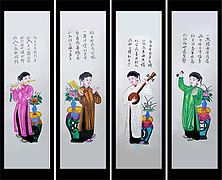 |
| Cuisine |
| Festivals |
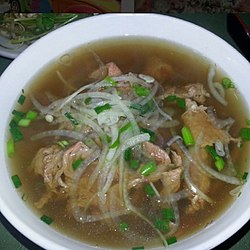


ベトナム料理は、ベトナムを起源とする食べ物と飲み物の総称である。食事は、甘味、塩味、苦味、酸味、辛味という5つの基本的な味(ngũ vị)の組み合わせを特徴とする。それぞれの料理の際立った個性は、五行思想に基づいた1つ以上の要素(栄養素や色など)を反映している。ベトナム料理のレシピでは、レモングラス、ショウガ、ミント、ベトナムミント、ロングコリアンダー、サイゴンシナモン、鳥の目唐辛子、ライム、タイバジルの葉などの食材が使われる。
伝統的なベトナム料理は、新鮮な食材を使い、乳製品や油の使用が少なく、興味深い食感があり、ハーブや野菜を多用することが特徴とされてきた。また、砂糖の含有量が少なく、多くの料理が小麦ではなく米をベースに、米麺、ライスペーパー、米粉で作られているため、ほとんどの場合、自然にグルテンフリーである。
歴史的影響
ベトナム料理は、その歴史の中で様々な文化から影響を受けてきた:
ベトナム料理は、固有のベトナムの影響が主要な核となっているが、中国との歴史的な接触と数世紀にわたるシナ化により、一部のベトナム料理は中華料理と類似点を共有している。料理の伝統において、中国はベトナムにいくつかの料理をもたらした。これには、vằn thắn/hoành thánh(ワンタン)、xá xíu(チャーシュー)、há cảo(ハーガオ)、hủ tiếu(沙河粉)、mì(小麦麺)、bò bía(ポピア)、bánh quẩy(油条)、月餅とバインピア(蘇州風月餅)、bánh tổ(年糕)、sủi dìn(湯圓)、バインボー、バインバオ(包子)、cơm chiên Dương Châu(揚州チャーハン)、そしてmì xào(チャオメン)が含まれる。ベトナム人はこれらの食べ物を取り入れ、独自のスタイルと風味を加えた。中国とベトナムの国境に近い山岳地帯の少数民族も、中国から一部の食べ物を取り入れた。ランソン省のタイ族やヌン族は、中国からthịt lợn quay(ローストポーク)やkhâu nhục(豚バラ肉の煮込み)を取り入れた。唐辛子やトウモロコシ(メイズ)のような新世界の野菜も、明王朝の時代にベトナムに伝わった。
フランスはバゲットをベトナムにもたらし、それがベトナム風の具材と組み合わさって、海外では「ベトナムバゲット」として知られるバインミーティットという人気のファストフードになった。Bánh mìは単にパンを指し、thịtは肉や具材を意味する。フランスはまた、ベトナムにタマネギ、ジャガイモ、ブロッコリー、トマト、カリフラワー、レタス、タラゴン、ニンジン、アーティチョーク、アスパラガス、そしてコーヒーをもたらした。
西洋からもたらされた食材には、しばしばベトナム語の名称に、類似のベトナム固有の食材の名称にtây(「西洋の」を意味する)という単語を付け加えたものがある。タマネギはベトナム語でhành tây(文字通り「西洋のエシャロット」)、アスパラガスはmăng tây(西洋のタケノコ)、ジャガイモはkhoai tây(西洋のヤムイモ)と呼ばれ、これはベトナムに到着する前のその起源を反映している。フランスの影響を受けた料理は数多く、これらに限られない。sa lát(サラダ)、パテ、パテショー(ブルターニュ地方のパイ、"パテショー"と呼ばれる)、bánh sừng trâu/bánh sừng bò(クロワッサン)、bánh フラン、ya ua(ヨーグルト)、rôti(ロティサリー)、bơ(バター)、vịt nấu cam(鴨のオレンジソース煮)、ốp lết(オムレツ)、ốp la(œufs au plat)、phá xí(ファルシー)、bít tết(ビーフステーキ)、sốt vang(ワイン煮)、dăm bông(ジャンボン)、そしてxúc xích(ソーシース)。フランス植民地支配の影響により、ラオス、ベトナム、カンボジアのフランス領インドシナ諸国は、バゲットやコーヒーを含むいくつかの共通の料理と飲み物を持っている。フランスはまた、ベトナムとフランスのフュージョン料理における乳製品の使用も導入した。
ベトナム料理は、チャム、マレーシア、カンボジアからの影響も受けている。ココナッツミルクの使用や、bánh khọtのような様々な中部料理はチャム料理の影響を受けた。カレーを含むスパイスも、マレー人やインド人商人によってベトナムにもたらされた。北部では一般的ではないが、cà riはベトナム中部と南部でかなり人気のある料理だ。最も一般的なのはチキンカレーで、それほどではないが、ヤギカレーもある。チキンカレーは、結婚式、葬儀、卒業式、愛する人の年忌法要など、多くの社交的な集まりで欠かせない料理だ。カンボジアと同様に、ベトナムのカレーはパン、蒸しご飯、または丸い米麺(ビーフン)と一緒に食べられる。ベトナム南部でクメール民族から取り入れられたmắm bồ hócまたはプラホックは、ベトナムの米麺スープbún nước lèoの主要な材料として使用されている。これはベトナムのクメール民族に由来し、カンボジアには見られない。
東ヨーロッパの以前の共産主義国との接触により、ベトナム人はキャベツの詰め物スープ、sa lát Nga(オリヴィエサラダ)、bia Tiệp(チェコビール)などの料理を取り入れた。
地域料理



ベトナムの3つの主要な地域の主流の料理の伝統は、いくつかの基本的な特徴を共有している。
- 食材の新鮮さ:ほとんどの肉は短時間しか調理されない(肉の色や食感を保つため)。野菜は生で食べられ、調理される場合も茹でるか短時間炒めるだけである。
- ハーブと野菜の存在:ハーブと野菜は多くのベトナム料理に不可欠であり、しばしば豊富に使われる。
- 多様性と食感の調和:カリカリと柔らかい、水っぽいものと歯ごたえのあるもの、繊細なものと粗いもの。
- スープやスープベースの料理は、3つの地域すべてで一般的である。
- 盛り付け:ベトナム料理に添えられる調味料は通常カラフルで、目を楽しませるように盛り付けられる。
ベトナムの料理の伝統はいくつかの主要な特徴を共有しつつも、地域によって異なる。
ベトナム北部は気候が寒冷なため、スパイスの生産と入手が限られる。そのため、この地域の料理は他の地域よりも辛くないことが多い。唐辛子の代わりに黒胡椒が最も人気のある辛味付けの材料として使われる。一般的に、北部のベトナム料理は、甘味、塩味、辛味、苦味、酸味といった特定の味を強く打ち出すことはない。ほとんどの北部のベトナム料理は、様々な調味料を繊細に組み合わせることで生まれる、軽くてバランスの取れた風味を特徴としている。豚肉、牛肉、鶏肉などの使用は過去には比較的限られていた。エビ、イカ、カニ、アサリ、ムール貝などの淡水魚、甲殻類、軟体動物が広く使われる。ベトナム北部の多くの有名な料理は、カニが中心である(例:ブンジウ)。ベトナム文明発祥の地である北部ベトナムは、ブンジウやバインクオンなど、ベトナムを代表する多くの料理を生み出し、ベトナム人の移住を通じて中部や南部ベトナムに伝えられた。ハノイ発祥のその他の有名なベトナム料理には、ブンチャー(焼いた豚肉と米麺)、phở gà(鶏肉と米麺のスープ)、チャー・カー・ラーヴォン(焼き魚と米麺)などがある。
ベトナム中部の山岳地帯で豊富に生産されるスパイスは、この地域の料理を辛いものとして際立たせ、他の2つの地域(料理はほとんど辛くない)とは一線を画している。ベトナム最後の王朝の首都であったフエの料理の伝統は、古代ベトナム王宮料理の影響を反映して、非常に装飾的で色彩豊かな料理を特徴としている。この地域の料理は、少量ずつ提供される多くの複雑な料理からなる洗練された食事でも知られている。唐辛子とエビ醤が頻繁に使われる材料の代表例である。ベトナム中部で生まれたベトナムを代表する料理には、ブンボー・フエやバインコアイがある。
ベトナム南部の温暖な気候と肥沃な土壌は、様々な果物、野菜、家畜を育てるのに理想的な条件を生み出している。その結果、南部ベトナムの料理は、ニンニク、エシャロット、新鮮なハーブがふんだんに使われ、しばしば活気があり風味豊かだ。他の地域よりも砂糖が多く加えられる。南部ベトナムの甘味に対する好みは、南部ベトナム料理におけるココナッツミルクの広範な使用にも見られる。広大な海岸線は、この地域の人々にとって魚介類を自然な主食としている。南部ベトナムの代表的な魚介料理には、バインコットやブンマムがある。
メコンデルタの料理は、新しい土地に豊富にある新鮮な産物に大きく依存しており、パームシュガー、発酵魚、魚介類、野生のハーブや花が多用される。この地域が新しく開拓された土地であるという歴史は、その料理にも反映されており、Ẩm thực khẩn hoang(入植者料理)とは、野生の採れたての食材や新しく捕れた食材から新鮮に調理された料理を意味する。この料理は、クメール人、チャム人、中国人入植者の影響も受けている。
北部および中央高地の料理は、thắng cố(モン族の馬肉シチュー)、乾燥肉、コムラム、ルオウカンなどの品目とともに、部族の伝統の影響を受けている。
ベトナム哲学との関連
ベトナム料理は、その特徴のバランスで知られる五行の考え方を常に含んでいる。
- 多くのベトナム料理には、**5つの基本的な味覚**(ngũ vị)が含まれている。これらは、辛味(金)、酸味(木)、苦味(火)、塩味(水)、甘味(土)で、それぞれ**5つの臓器**(ngũ tạng)である胆嚢、小腸、大腸、胃、膀胱に対応している。
- ベトナム料理には、5種類の栄養素(ngũ chất)も含まれている。これらは、炭水化物、水または液体、ミネラル要素、タンパク質、脂肪である。
- ベトナムの料理人は、料理に5つの色(ngũ sắc)を取り入れようとする。白(金)、緑(木)、黄(土)、赤(火)、黒(水)だ。
- ベトナムの料理は、5つの感覚(năm giác quan)を通じて美食家を魅了する。料理の盛り付けは目を引き、パリッとした食材からは音が聞こえ、5つのスパイスは舌で感じられ、主にハーブ由来の芳香は鼻を刺激し、そして一部の食事、特にフィンガーフードは触覚で感じられる。
五行対応表

ベトナム料理は、アジアの五行思想とマハーブータの影響を受けている。
| 対応 | 要素 | ||||
|---|---|---|---|---|---|
| 木 | 火 | 土 | 金 | 水 | |
| スパイス (ngũ vị) | 酸味 | 苦味 | 甘味 | 辛味 | 塩味 |
| 臓器 (ngũ tạng) | 胆嚢 | 小腸 | 胃 | 大腸 | 膀胱 |
| 色 (ngũ sắc) | 緑 | 赤 | 黄 | 白 | 黒 |
| 感覚 (ngũ giác) | 視覚 | 味覚 | 触覚 | 嗅覚 | 聴覚 |
| 栄養素 (ngũ chất) | 炭水化物 | 脂肪 | タンパク質 | ミネラル | 水 |
陰陽の調和
陰陽(Vietnamese: Âm dương)の原則は、身体に有益な均衡をもたらす方法で食事を構成する際に適用される。対照的な食感や風味も重要であるが、この原則は主に食材の「熱性」と「冷性」に関係している。特定の料理は、食べ物と環境の温度と辛さの対比を提供するために、それぞれの季節に供される。以下に例を挙げる。
- 「冷性」とされるアヒル肉は、暑い夏に「温性」の生姜ヌクマムと共に供される。逆に、「温性」の鶏肉や「熱性」の豚肉は冬に食される。
- 「冷性」から「寒性」の魚介類は、「温性」の生姜との組み合わせに適している。
- 辛い食べ物(「熱性」)は、一般的に「冷性」とされる酸味とバランスが取られる。
- バロット(trứng vịt lộn)、「ひっくり返った卵」を意味する「冷性」の食品は、「熱性」のベトナムミント(rau răm)と組み合わせなければならない。
ライフスタイルと食



ベトナム料理は、調理から供され方まで、ベトナム人のライフスタイルを反映している。長期間にわたる戦争や政治紛争、文化の変化を経て、ベトナム国民の大部分は貧困の中で暮らしてきた。そのため、ベトナム料理の食材は非常に安価であることが多いが、それにもかかわらず、それらが組み合わされて陰陽のバランスが作り出される調理法によって、料理は見た目はシンプルだが風味豊かである。
経済状況により、食材を最大限に活用して費用を節約することがベトナム料理の伝統となっている。数十年前、そして今日でも農村部では、牛は筋肉の肉から腸まであらゆる部位が使われ、何も無駄にされない。家畜(牛、豚)の質の良い部位は炒め物、スープ、その他の料理に使われ、二級品は血のソーセージやスープに使われる。ネギのような野菜も同様で、葉の部分は細かく刻んで料理の風味付けに使われ、シャキシャキとした茎や根は植え直される。
Nước mắm(魚醤)は、ベトナム料理で最も一般的に使われる象徴的な調味料である。発酵させた生の魚から作られ、ほとんどのベトナム料理に添えられる。ベトナム料理は最高品質の食材で知られているのではなく、むしろ非常に安価でシンプルな残り物を創造的に混ぜ合わせ、大胆な風味の料理を生み出すことで知られている。伝統的な南部ベトナムの食事には、通常、cơm trắng(白米)、cá kho tộ(ナマズの土鍋煮)、canh chua cá lóc(酸味のあるスープと雷魚)、そして調味料として魚醤が添えられなければ完成しない。料理は見た目よりも、長い一日の仕事の後、家族全員が集まるような家庭料理として供される。魚を同じ土鍋で調理し、そのまま食卓に出すことは、古くからの伝統であることが証明されている。
東南アジアの小国であるにもかかわらず、ベトナムの各地域の料理は、その土地の人々の地理的および生活環境を反映した独特の特性を持っている。伝統的な南部ベトナムの食事は、肥沃なメコンデルタでしか手に入らない、雷魚のような新鮮な食材や、マンゴスチン、マンゴー、ドラゴンフルーツなどの幅広い熱帯の果物で構成されている。南部風の食事は、野菜、魚、熱帯の果物を主成分とする非常に「グリーン」なものである。
ベトナム中部は、最も強く大胆な風味の料理が作られる地域である。この地域は年間を通して厳しい気象条件が続くため、そこでは北と南のベトナムの人々ほど多くの緑豊かな食材が手に入らない。その代わりに、ベトナム中部沿岸地域は塩と魚醤の産業で知られており、これら2つの調味料が彼らの日々の食生活の中心となっている。
ベトナム北部の料理は中国の影響が強く、その象徴的な料理はフォーである。南部ベトナムの食事では米が主食であるのに対し、北部は麺を好む。ベトナムの3つの主要地域の気候とライフスタイルの劇的な違いにより、料理は多様である。北部ベトナム料理は、ベトナム中部および南部の料理と比較して、風味が最も控えめで辛くない。
典型的なベトナムの家庭料理

ベトナム人の日常の食事は、レストランや屋台で供されるベトナム料理とはかなり異なる。一般的なベトナム家庭の典型的な食事には、以下が含まれる:
- Cơm trắng: 炊いた白米
- Món mặnまたはご飯と一緒に食べる主菜: 魚介類、肉、豆腐(焼く、茹でる、蒸す、煮る、野菜と炒めるなど)
- Rau: 炒め物、茹で物、または生の新鮮な青野菜
- Canh(野菜と肉または魚介類が入った澄んだスープ)またはその他の種類のスープ
- ヌックチャム: メインディッシュに応じたつけダレや調味料。純粋な魚醤、生姜魚醤、タマリンド魚醤、醤油、muối tiêu chanh(塩と胡椒とライムジュース)、またはmuối ớt(塩と唐辛子)など。
- 塩漬けナス、白菜の漬物、パパイヤの漬物、ニンニクの漬物、もやしの漬物などの小皿料理
- Tráng miệngまたはデザート: 新鮮な果物、飲み物、またはチェーなどの菓子。
個々の茶碗に入ったご飯を除いて、すべての料理は共有され、テーブルの中央に置かれる。また、若い人々が年長者に先に食事をするよう頼む/待つことや、ご飯の鍋のすぐそばに座る女性が他の人にご飯を盛ることが習慣である。人々は「お食事をどうぞ」と言うのと同様に、年長者から若い人々へと順番に、他の人々に食事を楽しむよう「招く」べきである。彼らはまた、思いやりの行動として、お互いのために料理を取り分ける。
ごちそう

ごちそう(Vietnamese: cỗ、tiệc)は、家族や村にとって重要な行事であり、通常、各テーブルに最大12人が着席する。ごちそうは結婚式、葬儀、祭り、長寿を祝う儀式のために用意される。ごちそうでは、普段の食事は出されず、炊いた米は依然として使われる。
ベトナムのごちそうは2つのコースからなる。メインコース(món mặn—塩味の料理)とデザート(món ngọt—甘味の料理)である。個々の茶碗に入ったご飯を除いて、すべての料理は皆で楽しむ。メインコースのすべての料理は、一品ずつではなく同時に供される。メインコースの主要な料理はテーブルの中央に置かれ、通常は大きなスープ鍋や鍋物である。
基本的なごちそう(cỗ một tầng)は10品から構成される。5つの鉢物(năm bát):bóng(乾燥させて揚げた豚皮)、miến(春雨)、măng(筍)、mọc(肉団子)、chimまたはgà tần(鳥肉または鶏肉の煮込み料理)、そして5つの皿物(năm đĩa):giò(ベトナムソーセージ)、chả、gàまたはvịt luộc(茹で鶏または茹で鴨)、ノム(ベトナムサラダ)、xào(炒め物)である。この種のごちそうは伝統的であり、北部ベトナムでのみ催される。他のバリエーションは中部および南部ベトナムに見られる。
テトのごちそうに不可欠な4品は、chả giò (揚げ春巻き)、nem(北部ベトナムでは、nemはnem cuonまたはnem ranと呼ばれる春巻きを指す。南部ベトナムでは、nemは主にネムチュア、発酵豚肉のロールを指す)、ninh(煮込み料理)、mọc(麺入りスープ)である。この時期、先祖供養のごちそうには、もち米、茹で鶏、ベトナムの米ワイン、その他先祖が好んだ食べ物が含まれる。客はごちそうを去る前に贈り物が渡される。
宮廷料理

阮朝時代には、国王に仕えるために全国から最高の料理人50名がThượng Thiện(トゥオンティエン)庁に選抜された。食事は1日3食で、朝食は12品、昼食と夕食は66品(主菜50品、菓子16品を含む)であった。不可欠な料理は燕の巣のスープ(tổ yến)であった。その他の料理には、フカヒレ(vi cá)、アワビ(bào ngư)、鹿の腱(gân nai)、熊の手(tay gấu)、サイの皮(da tê giác)などが含まれた。水はHàm Longの井戸、Báo Quốcパゴダ、Cam Lồの井戸(Thúy Vân山の麓近く)、またはHương川の源泉から汲み上げなければならなかった。米はAn Cựuの王室水田で栽培されたde種であった。米を炊くためのPhước Tíchの土鍋は、一度だけ使用された後に廃棄された。調理された料理には、料理人とThượng Thiện庁のメンバー以外は誰も接触することを許されなかった。料理はまず宦官に供され、次に国王の妃たちに供された後、国王に献上された。国王は快適な音楽の流れる空間で一人で食事(ngự thiện)を楽しんだ。
文化的重要性
塩は、生者の世界と死者の世界を結びつけるものとして使われている。バインフーテーは、結婚式で新しい夫婦に完璧さと調和を思い出させるために使われる。食べ物は、特別な機会(旧正月など)に、死者への供物として先祖の祭壇に供されることが多い。料理と食事は、ベトナム文化において極めて重要な役割を担っている。
ことわざ
「食べる」を意味するănという言葉は、非常に多くのことわざに含まれ、幅広い意味的拡張を持つ。
- Ăn trông nồi, ngồi trông hướng(「食事中に飯鍋の様子を見て、座る場所/方向を見る」)=失礼がないように注意せよ。
- Ăn theo thuở, ở theo thì(「季節に応じて食べ、季節に応じて生きる」)=自分の分と社会状況に応じて生きる。
- Cha ăn mặn, con khát nước(「父親が塩辛いものを食べると、子供が喉が渇く」)=悪い行いは後で子孫に悪運/結果をもたらす。
- Nhai kĩ no lâu, cày sâu tốt lúa(「よく噛むと満腹感が長く続き、深く耕すと米がよく育つ」)=性急な行動よりも慎重な実行の方が良い結果をもたらす。
- Học ăn, học nói, học gói, học mở(「食べ方、話し方、包み方、開け方を学ぶ」)=すべては学ぶ必要があり、最も単純なこと、例えば礼儀正しい「食べ方」から始める。
多くのベトナムの慣用句は、「セックス=食べる」という関連性を反映している。
- Ông ăn chả, bà ăn nem(「彼が肉団子を食べ、彼女が揚げ春巻きを食べる」)=夫も妻も浮気をしている。
- Chán cơm thèm phở(「米に飽きて、麺スープを渇望する」)=男が妻に飽きて、別の女を見つける。
- Ăn bánh trả tiền(「お菓子を食べるなら、お金を払う」)=売春婦とセックスする前に支払う。(要するに、bánhは売春婦の隠喩である。)
- Ăn vụng không biết chùi mép(「こっそり食べて口元を拭かない」)=不倫をして痕跡を残す。
国際的な人気
ベトナム国外では、ベトナム料理はオーストラリア、アメリカ合衆国、カナダ、フランスなど、ベトナム移民コミュニティの強い国々で広く普及している。また、日本、韓国、チェコ共和国、スロバキア、ドイツ、イギリス、ポーランド、フィリピン、ロシア、そしてアジア系住民の多い地域でも人気がある。
ベトナム料理を特集したテレビ番組の人気が高まっている。オーストラリア出身のルーク・グエンは現在、ベトナム料理を紹介し、調理法を教えるテレビ番組Luke Nguyen's Vietnamを放送している。
『ザ・グレート・フード・トラック・レース』では、ベトナムサンドイッチのフードトラック「Nom Nom Truck」が最初の5エピソードで最も多くの売上を記録した。
アンソニー・ボーディンはこう記している:
ベトナムでは素晴らしい料理を探し回る必要はない。素晴らしい料理があなたを見つけるだろう。それはどこにでもある。レストラン、カフェ、小さな店先、路上で、女性行商人が担ぐ天秤棒の間に作られた持ち運び可能なキッチンで運ばれている。あなたのシクロ運転手は彼らの家にあなたを招くだろう。あなたのガイドは彼のお気に入りの場所にあなたを連れて行きたがるだろう。見知らぬ人が駆け寄ってきて、彼らが誇りに思っている、あなたが知るべきだと思っている何かを味見させてくれるだろう。それは誇り高き料理人と情熱的な食いしん坊で満たされた国なのだ。
ゴードン・ラムゼイは、リアリティ番組ゴードン・ラムゼイのグレート・エスケープ – S02E02 (2011)でベトナムを訪れ、この地の料理の味に魅了された。特に、カイラン水上マーケット、カントーの小舟でDì Hai夫人によって調理され提供されたフーティウ・ミーという料理に感銘を受けた。彼は『アメリカン・マスターシェフ』シーズン4エピソード21で、トップ5の最終候補者のエリミネーションチャレンジの課題料理の一つとしてこの料理を取り上げた際、「今まで食べた中で最高の料理だ」と絶賛した。
2024年、CNNはフォーを「世界のスープベスト20」のリストに含め、その濃厚な出汁と芳香なスパイスを強調した。
調理法





一般的なベトナムの料理用語には以下がある。
- Rán, chiên – 揚げ物
- Chiên nước mắm – 揚げてから魚醤で和える
- Chiên bột – 衣をつけてから揚げる
- Rang – 油をほとんど使わない、または全く使わない空炒め
- Áp chảo – フライパンで焼いてからソテーする
- Xào – 炒め物、ソテー
- Nhồi thịt – 調理前にひき肉を詰める
- Sốt chua ngọt – 甘酸っぱいソースで炒める
- コー – 煮込み料理、ブレゼ料理
- Nấu – 料理する、通常は鍋で調理する
- Nấu nước dừa – ココナッツウォーターで調理する
- Hầm/ninh – スパイスや他の食材と一緒に時間をかけて煮込む
- Canh – ご飯にかけて食べる、スープのような汁物
- Rim – 煮詰める
- Luộc – 水で茹でる、通常は新鮮な野菜や肉
- Chần/trụng – ブランシュ(下茹で)
- Hấp – 蒸し料理
- Om – 北部地方の土鍋料理
- Om sữa – 牛乳と一緒に土鍋で調理する
- Om chuối đậu – 若いバナナと豆腐と一緒に調理する
- ゴイ – サラダ料理、通常は肉や魚入り
- Gói lá – 生の食材を葉(しばしばバナナの葉)で包んで形を整え、香りを高める
- Nộm – サラダ、通常は肉なし
- Nướng – グリル料理
- Bằm/băm – 刻んだ食材を混ぜてソテーする
- Cháo – 粥料理
- Súp – スープ料理(canhや澄んだスープとは異なる)
- Rô ti – 肉をローストしてから煮込む、通常は強いスパイスを使う
- Tráng – 蒸した/熱い表面に食材を薄く広げる
- Cà ri – カレーまたはカレー風の料理
- Quay – ロースト料理
- Lẩu – 鍋料理
- Nhúng dấm – 酢ベースの鍋で調理する。酢とココナッツウォーターベースの鍋もバリエーションに含まれる。
- クオン – ライスペーパーでブンと新鮮なハーブを巻いた料理全般
- Bóp thấu/tái chanh – 生の肉や魚介をライムや酢で調理する。
ベトナムの調理器具

一般的な食材
野菜

果物

ハーブ (rau thơm)

|
調味料とソース
調味料
ベトナムでは通常、生の野菜であるrau sốngやrau ghém(スライスした野菜)を料理の薬味として使用し、それぞれの主菜と風味のバランスを適切に組み合わせる。rau sốngが不可欠な料理は、bánh xèoや鍋物である。野菜は主にハーブや、森林や家庭菜園で採集された野生の食用野菜である。葉や蕾が最も一般的に使われる野菜の部分である。ほとんどの野菜には薬効がある。
Rau sốngには、レタス、生もやし、ハーブ、バナナの千切り、青バナナ、空芯菜、マンゴーの蕾、グアバの葉などが含まれる。
ハーブとスパイス

- コリアンダーと青ネギの葉は、ほとんどのベトナム料理で見られる。
- 野菜を炒める基本的なテクニックは、野菜を鍋に入れる前に、ニンニクまたはエシャロットを油で炒めることである。
- 北部ベトナムでは、魚料理にディルが添えられることがある。
- 中部ベトナムでは、ひき肉にしたレモングラスと唐辛子の混合物が牛肉料理によく使われる。
- 南部ベトナムでは、ほとんどの煮込み料理にココナッツウォーターが使われる。
- ロングコリアンダー(ngò gai)とコメパディハーブ(ngò ôm または ngổ)の組み合わせは、南部ベトナムのあらゆる種類の酸味のあるスープに不可欠である。
- スペアミントは、魚臭さの強い料理によく使われる。
- シソは通常、カニ料理に使われる。
組み合わせ
- 鶏肉料理にはライムの葉を組み合わせる。
- カニや貝の料理にはドクダミとシソを組み合わせる。
- ナマズ、アサリ、カタツムリなど、「冷性」または「魚臭い」とされる料理には、ショウガまたはレモングラスを組み合わせる。
- 牛肉料理にはセロリまたはパイナップルを組み合わせる。
ソース
- ヌックチャム
- マムトム(シュリンプペースト)
- ヌクマム(魚醤)は、そのまま使用することも、レモン汁、ニンニク、酢、砂糖、唐辛子と混ぜて使用することもできる。この混合物はnước mắm phaと呼ばれる。
- トゥオンは発酵させた大豆から作られる。
- 醤油は主にマリネやソースに使われる。
- ホイシンソースは、南部ベトナムではフォーを提供する際に混ぜて使われる。
- ホットチリソース。
着色料

伝統的に、ベトナム料理の着色は天然の材料に由来する。しかし、今日ではベトナムにおいて食品着色料として人工的な食品染料の使用が増加している。
- 赤 – 通常はビーツから、またはアナトーの種を揚げて油(dầu điều)を作る。
- オレンジ – 通常もち米に使われ、ガックから抽出される。
- 黄色 – ウコンから。
- 緑 – パンダンの葉またはカトゥクから。
- 紫 – マゼンタプラント(lá cẩm)から。
- 黒 – banh gaiではラミーの葉(lá gai)から。
- 濃い茶色 – 煮込み料理には、砂糖をキャラメル(170°C)以上の温度に加熱して作られるnước màuまたはnước hàngを使用する。
着色料は、すり潰した着色料や液体着色料を混ぜるか、煮沸前に包んで抽出物を得ることで吸収させることができる。料理を着色する際には、着色料の味や香りも考慮しなければならない。
人気料理
ベトナム料理が英語で言及される場合、一般的に発音区別符号なしのベトナム語名で呼ばれる。一部の料理には、記述的な英語名も付けられている。
人気のベトナム料理には以下がある:
麺料理


ベトナム料理は多種多様な麺スープを誇り、それぞれが明確な影響、起源、風味を持つ。これらのスープの多くに共通する特徴は、濃厚な出汁である。
| 名称 | 説明 |
|---|---|
| ブンボーフェ | ベトナム中部の古都フエ発祥の辛い牛肉麺スープである。牛肉の骨、発酵させた海老のペースト、レモングラス、乾燥唐辛子が出汁に特徴的な風味を与えている。しばしばミントの葉、もやし、ライムのくし切りと共に供される。一部のレストランでは豚足も一般的な食材である。 |
| Bún măng vịt | タケノコと鴨肉の麺スープである。 |
| ブンオック | タニシのヴェルミチェッリ(タニシと麺、トマトと豚骨の出汁、豆腐、ハーブ)である。 |
| バインカイン | シンプルな出汁にとろみのあるタピオカ/米麺スープで、しばしば豚肉、カニ、鶏肉、エビ、青ネギ、生の玉ねぎが上に散らされている。 |
| ブンジウ | 細い米麺を使った麺スープで、カニと海老のペーストが乗せられ、トマトベースの出汁で供され、もやし、エビペースト、ハーブの葉、タマリンド/ライム、豆腐、空芯菜、角切りのトマトが添えられる。 |
| ミー (súp mì) | 中華風の小麦(卵)麺スープである。 |
| フォー | 肉とスパイスを長時間煮込んで作る濃厚で澄んだ出汁の麺スープで、その多くの種類は異なる肉(最も一般的なのは牛肉または鶏肉)と牛肉の肉団子で作られる。Phởは通常、青ネギ、半生の牛肉のスライス(phở táiの場合、熱い出汁で火を通す)、そして出汁と共に丼で供される。南部では、もやしや様々なハーブも加えられる。 |
| Phở satế | 薄切りにしたレアステーキ、サテのホットチリソース、スライスしたキュウリ、トマト、ピーナッツが入ったスパイシーな麺スープである。 |
| Mì vịt tiềm | ローストダックとチャイニーズブロッコリーが入った黄色い麺スープである。 |
| Bún chả cá | 揚げた魚のすり身が入った米麺スープである。 |
| フーティウ | 多くの異なるスタイルの麺スープで、「ドライ」(スープではなくソースがかかっている)バージョンもある。これはカンボジアからの中国(潮州)移民によってベトナムにもたらされたものである。麺は通常卵麺または米麺であるが、他の多くの種類も使用されることがある。スープのベースは豚骨から作られる。 |
スープとcháo(お粥)
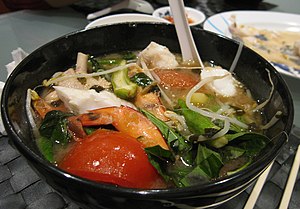
| 名称 | 説明 |
|---|---|
| Súp măng cua | アスパラガスとカニのスープで、通常は宴会の最初の料理として供される。 |
| Lẩu(ベトナム風鍋) | 様々な野菜、肉、魚介類、スパイシーなハーブを使ったベトナムの酸っぱいスープのスパイシーなバリエーションである。 |
| チャオ | お粥の一種で、鴨肉、内臓、魚など様々な出汁と肉が使われる。鶏肉が使われる場合はcháo gàと呼ばれる。 |
| Cháo lòng | 豚の腸、肝臓、砂肝、心臓、腎臓が入った米のお粥である。 |
| ボーコー | ニンジン入りの牛肉の煮込みで、通常はトーストしたパンまたは米麺と共に供される。 |
| Nhúng dấm | 薄切りにしたレアビーフと魚介類を酸味のある出汁で調理した火鍋で、細い米麺、新鮮な野菜、ライスペーパーの春巻きの皮、つけダレと共に供される。 |
| カインチュア | ベトナムの酸っぱいスープで、通常、魚、パイナップル、トマト、ハーブ、もやし、タマリンド、様々な種類の野菜が含まれる。 |
米料理

| 名称 | 説明 |
|---|---|
| コムチェンズオンチャウ | 中国の揚州地方にちなんで名付けられた中華風チャーハンで、ベトナムでもよく知られている料理である。 |
| Cơm gà rau thơm (鶏肉と米とミント) | 鶏だしで炊いたご飯に、揚げてから細かく裂いた鶏肉を乗せ、ミントなどのハーブを添えた料理である。ご飯には独特の食感と風味があり、揚げたミントの飾り付けがそれを引き立てる。特製ハーブソースが添えられる。 |
| コムヘン | アサリご飯で、フエとその周辺地域で人気のある安価な料理である。 |
| Cơm chiên cá mặn | 塩漬け発酵魚と刻んだスノーピー、鶏肉のチャーハンである。 |
| Cá/thịt kho | 魚または豚肉を土鍋で煮込んだ伝統的な家庭料理で、甘酸っぱいスープ(canh chua)と共に供される。 |
| Gà xào gừng | 鶏肉のショウガと魚醤炒めである。 |
| ボールクラック | キュウリ、トマト、玉ねぎ、コショウ、醤油でソテーしたサイコロ状の牛肉である。 |
| コムラム | 竹筒で茹でるか蒸して調理した米(しばしばもち米)である。 |
| コムタム | 一般的に、グリルした豚肉(スペアリブまたは細かく裂いたもの)を、bì(薄く細かく裂いた豚肉を、調理して薄く細かく裂いた豚皮と炒めた米粉を混ぜたもの)と共にcom tam(「砕き米」)に乗せ、甘酸っぱい魚醤をかけて供される。様々な方法で調理された他の種類の肉も、砕き米と共に供されることがある。バーベキューした牛肉、豚肉、鶏肉が一般的な選択肢で、砕き米と共に供される。ご飯と肉には、様々な青菜や漬物、エビペーストケーキ(chả tôm)、蒸し卵(trứng hấp)、グリルしたエビが添えられる。 |
もち米料理

| 名称 | 説明 |
|---|---|
| バインチュン | バナナの葉で包み、緑豆ペースト、赤身の豚肉、黒胡椒を詰めたもち米料理で、伝統的に旧正月(テト)に食べられる。Bánh chưngは北部で人気があり、似たようなバインテトは南部でより人気がある。Bánh tétは同じ内容だが、円筒形をしており、赤身の豚肉が脂身の豚肉に置き換えられている。 |
| ソイ | ココナッツミルクともち米を、米を炊くのと同じ方法で調理するか、蒸してしっかりとした食感と風味豊かな味に仕上げたもので、様々な種類がある。 |
| Xôi Mặn | 人気のベトナム屋台料理である。しょっぱいもち米に、lạp xưởng(中華ソーセージ)、干しエビ、チャールア、肉でんぶ、シイタケなどの具材がたっぷり入り、醤油がかけられている。 |
バイン
ベトナム語で菓子を意味する言葉は**バイン**である。多くの菓子は様々な葉(竹、バナナ、ドン、ガイ)に包んで茹でたり蒸したりされる。ベトナム国家の神話的な建国に遡る歴史的な料理の一つにバインチュンがある。これは甘くない料理であり、真の菓子ではないが、バインチュンとそれに付随するバインザイは天地の象徴を帯びている。これらの料理はベトナムの正月(テト)の供物と関連付けられている。さらに、フランス植民地時代の遺産と影響として、ブッシュ・ド・ノエルはクリスマスシーズンに供される人気のデザートである。


| 名称 | 説明 |
|---|---|
| バインバオ | 蒸しパンの餃子で、玉ねぎ、キノコ、または野菜を詰めることができる。bánh baoは、中国の包子をベトナム人の好みに合わせて翻案したものである。仏教寺院ではベジタリアンbanh baoが人気である。一般的な具材には、中華料理のマリネしたバーベキュー豚肉のスライス、小さな茹でたウズラの卵、豚肉などがある。 |
| バインベオ | 中部ベトナム料理で、小さな丸い米粉のパンケーキで構成され、それぞれが同様の形をした皿で供される。刻んだエビと、チャイブ、揚げたエシャロット、豚の皮などの他の具材が乗せられ、ヌックチャムと共に食べられる。 |
| バインボッチエン(揚げ米粉料理) | 中華風の菓子で、アジア全域に多くの種類が存在する。ベトナム版は、特別なピリ辛醤油が添えられ、揚げ卵(アヒルまたは鶏肉)といくつかの野菜が入った米粉の立方体が特徴である。これはベトナム南部で若い学生に人気のアフタースクールスナックである。 |
| バインボットロック | フエ料理で、澄んだ米粉の衣で作られた小さな米団子で、しばしば小さく平らな筒状をしており、エビと豚ひき肉が詰められている。バナナの葉に包んで調理され、よりカジュアルなビュッフェ形式のパーティーでは、ベトナムのオードブルとして供されることが多い。 |
| バインセオ | 米粉にターメリック、殻付きエビ、薄切りにした脂身の豚肉、薄切り玉ねぎ、そして時にはマッシュルームを加えて作られた平たい揚げ物で、油、通常はベトナムで最も人気のあるココナッツオイルで揚げられる。レタスと様々な地元のハーブと共に食べ、ヌックチャムまたは甘い発酵ピーナッツバターソースに浸して食べる。ライスペーパーがbanh xeoとそれに添えられる野菜を包むのに使われることもある。 |
| バインナム | フエ料理で、米粉、エシャロット、エビで作られ、コショウで味付けされた平たい蒸し米団子である。バナナの葉に包んで調理され、魚醤と共に供される。 |
巻き物料理

| 名称 | 説明 |
|---|---|
| バインクオン | 豚ひき肉、エビ、キクラゲを詰めた米粉のロールで、チャ(ソーセージ)など多くの付け合わせと共に様々な方法で食される。 |
| ビークオン | 薄く細かく裂いた豚肉と薄く細かく裂いた豚皮を、粉末にした炒り米などと共に混ぜたbì(ビー)を、サラダと共にライスペーパーで巻いたもので、生春巻きに似ている。 |
| ボービア(ベトナム風ポピア) | 炒めたクズイモとニンジンを中華ソーセージと細かく刻んだスクランブルエッグと混ぜ合わせ、ライスペーパーで巻いて、スパイシーなピーナッツソース(挽きたての焙煎ピーナッツ入り)に浸して食べる。中国(福建/潮州)を起源とし、移民によってもたらされたものである。サイゴン(特にチョロン)では、年老いた潮州の男性や女性が路上でbò bíaを売っているのをよく見かける。bò bíaという名前は、潮州語での元の名前ポピアの音に似ている。 |
| チャージョーまたはネムザン(北部) | 一種の春巻き(エッグロールと呼ばれることもある)で、豚肉、ヤムイモ、カニ、エビ、米麺、キノコ(「キクラゲ」)などの具材を詰めて揚げた小麦粉のロールである。春巻きには多くの名前があり、多くの人が(誤って)「春巻き」という言葉を、ライスペーパーを水に浸して柔らかくし、様々な具材を巻いた新鮮で透明なライスペーパーロール(下記「生春巻き」として説明)を指して使うことがある。伝統的に、これらのロールはライスペーパーの皮で作られていたが、近年、ベトナム国外のベトナム人シェフは小麦粉の皮を使用するようにレシピを変更している。 |
| ゴイクオン | ベトナムの生春巻き、サラダロール、または生春巻きとしても知られており、エビ、ハーブ、豚肉、米麺、その他の具材を巻いてヌックチャムまたはピーナッツソースに浸して食べるライスペーパーロールである。春巻きはベトナム料理のほぼ全カテゴリーを構成しており、様々な種類の春巻きには異なる具材が入っている。 |
バインチャンは以下のいずれかとして理解される。
- Bánh tráng nướng(南部)、またはbánh đa(北部)
- これらは大きくて丸く平らな米のクラッカーで、加熱すると丸く膨らみ、簡単に砕ける破片となる。単独で食べることもできるが、カオラウやミー・クアンのようなビーフン麺料理に加えるのが最も一般的である。透明なゴマ入りのもの、干しネギ入りのエビ風味クラッカー、甘いミルク味など、様々な種類のバインチャンが存在する。
サンドイッチとペストリー
| 名称 | 説明 |
|---|---|
| バインミー kẹp thịt | ベトナムのバゲットまたはフランスパンは、伝統的にパテ、ベトナムのマヨネーズ、コールドカット、ハラペーニョ、ピクルスにした白大根、ピクルスにしたニンジン、キュウリのスライスが詰められる。伝統的なコールドカットにはハム、ゼリー寄せ、ベトナムのボローニャソーセージが含まれるが、卵、イワシ缶詰、細切り豚肉、揚げ豆腐、グリル肉など、様々な具材が一般的である。サンドイッチにはしばしばコリアンダーの葉と黒胡椒が添えられる。 |
| Bánh パテショー | フランスの影響を受けた肉入りペイストリーで、サクサクした皮と豚肉または鶏肉の具が特徴である。 |
| Bánh mì ốp la | ベトナム風目玉焼きサンドイッチ。"Ốp la"は「サニーサイドアップ」を意味する。 |
肉料理

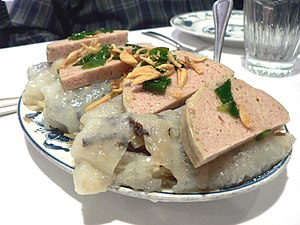
| 名称 | 説明 |
|---|---|
| ボーコー(肉スープ) | 牛肉と野菜のシチューで、しばしば温かいスパイシーなハーブと共に調理され、浸すために熱々のフランスパンと共に供される。北部ベトナムではbò sốt vangとして知られている。 |
| ボーラーロット | キンマの葉(lá lốt)で巻いて焼いた味付け牛肉料理 |
| ボールクラック(シャカシャカ牛肉) | フランスの影響を受けた料理で、牛肉を角切りにしてマリネし、青菜(通常はクレソン)、ソテーした玉ねぎとトマトの上に盛り付け、ご飯と共に食べる。 |
| ボーバイモン(牛肉7品) | 牛肉料理7品からなる多品目コース料理。牛肉がより広く消費されるようになったフランス植民地時代に発展した。 |
| カーバイモン(魚7品) | Bò 7 mónと同様のコース構成で、牛肉を魚に置き換えたもの。元のバリエーションよりも人気がない。 |
| チャールア or giò lụa | 豚赤身のひき肉と片栗粉で作られたソーセージで、揚げたものも入手できる。chả chiênとして知られる。様々な種類のチャ(ソーセージ)は、鶏ひき肉(chả gà)、牛ひき肉(chả bò)、魚(chả cá)、または豆腐(chả chay、またはベジタリアンソーセージ)で作られる。 |
| ガーヌンサー | レモングラス(sả)とグリルした鶏肉。レモングラスとグリルした牛肉や他の肉も人気のあるバリエーションである。 |
| ジョートゥ | Giò thủは、新鮮なベーコン、豚耳、ニンニク、ワケギ、玉ねぎ、黒キクラゲ、魚醤、粗挽き黒胡椒で作られた豚の頭のゼリー寄せである。 |
| ネムヌン | 味付けした豚肉で作られるのが一般的で、しばしば着色料で赤みを帯び、独特の風味を持つグリルした肉団子で、シシカバブのように串に刺して焼かれる。マリネの材料には魚醤が含まれる。 |
| Nem nguội | フエ料理で、Nem nướngミートボールのバリエーションであり、これもベトナム中部発祥である。冷製で、小さく長方形の形をしており、ヴェルミチェッリが詰められている。赤みがかった肉はコショウ、そして通常は唐辛子で覆われている。非常に辛く、ほとんどカクテルスナックとしてのみ食べられる。 |
魚介料理

| 名称 | 説明 |
|---|---|
| Bánh Tôm | エビとサツマイモのフリッター |
| Cá cuốn ho | 魚と青ネギのロール |
| Cá kho tộ | 土鍋で煮込んだ魚のキャラメル煮 |
| チャオトム | サトウキビの上のエビペースト/ケーキ |
| Cua rang muối/me | 塩胡椒/タマリンドで中華鍋で炒めたカニ |
サラダ

ノム(北部方言)またはGỏi(南部方言)はベトナムのサラダである。多くの種類がある中で、最も人気のあるものには以下がある。
| 名称 | 説明 |
|---|---|
| Gỏi đu đủ | ベトナムのパパイヤサラダ。通常、細切りパパイヤ、ハーブ、エビ、豚肉のスライス、レバー、またはジャーキーなどの様々な肉、ハーブが含まれ、より酢ベースのnước chấmで提供される。 |
| Gỏi Huế rau muống | フエ(中部ベトナム)発祥のサラダ料理で、空芯菜(rau muống)を含む。 |
| Nộm ngó sen | 蓮の茎のサラダで、エビと豚肉または鶏肉が入る。 |
| Gỏi đậu hủ | 細切りキャベツ、ミント、醤油ドレッシングを添えた豆腐サラダ。 |
| ゴイニエック | 細切り野菜のタニシウナギサラダ。 |
| Nộm sứa | ニンジン、キュウリ、ゴマドレッシングを添えたクラゲサラダ。 |
| Gỏi chân vịt | 細切りキャベツと甘酸っぱい魚醤を添えた鴨の足サラダ。 |
| Bò tái chanh | 薄切りにしたレアビーフ、フレッシュレモン、玉ねぎ、フライドオニオン、魚醤を添えた細切りサラダ。 |
| Gỏi gà bắp cải | 鶏肉とキャベツのサラダ。 |
| Gỏi mít | ピーナッツ、ミント、魚醤を添えた若いパラミツのサラダ。 |
カレー
- ベトナムのカレーも人気があり、特に中部と南部では、インド、クメール、マレーの商人の文化的影響を受けている。
- もう一つの有名なベトナムカレーは、牛肉のブリスケットカレーまたはテールカレーである。牛肉のカレーは、浸すためのフランスパンやご飯と共に供されることが多い。
- Cà ri gàは、鶏肉、ニンジン、サツマイモ、エンドウ豆をココナッツカレーソースで煮込んだ人気のベトナムカレーである。これもご飯またはバゲットと共に供される。
保存食
Muối(文字通り「塩漬け」を意味する)とchua(文字通り「酸っぱい」または「発酵させる」を意味する)は、ベトナム語で保存食を指す言葉である。多雨のモンスーン熱帯気候は、ベトナム人に一年中豊富な野菜の供給をもたらす。ベトナムの歴史において畜産が大規模に行われたことはなく、そのため保存食は主に植物ベースの漬物料理である。魚介類はしばしば魚醤のようにmắmと呼ばれる発酵食品に加工される。

| 名称 | 説明 |
|---|---|
| Bắp cải muối xổi | 細切りキャベツの即席漬け。 |
| Dưa chua, Dưa cải muối chua | ある種の高菜から作られる。 |
| Cà pháo muối | ベトナムナスから作られる。 |
| Dấm tỏi | 酢漬けニンニク。 |
| Dưa kiệu | Allium chinenseから作られ、テトの祝日の料理である。 |
| Dưa hành | ネギの球根またはエシャロットから作られる。 |
| Dưa món | ニンジン、白大根、または青パパイヤから作られる。 |
| Măng muối | 唐辛子入り細切りタケノコの漬物。 |
| Ớt ngâm | 米酢漬け唐辛子。 |
| Rau cần muối xổi | セリの即席漬け。 |
| Tôm chua | 甘辛い漬物エビ。 |
マム
Mắmは、ベトナム語で発酵させた魚、エビ、その他の水生食材を指す言葉である。主菜として、材料として、または調味料として使用される。mắmを作るのに最も一般的に使われる魚の種類は、イワシ、ナマズ、ライギョ、サバである。魚の身は原形をとどめており(これがnước mắmとの違いである)、加熱しても生でも、野菜や調味料を添えても添えなくても食べられる。魚醤はベトナム語で文字通り「mắm水」と呼ばれ、mắmの発酵過程から得られる蒸留液である。

| 名称 | 説明 |
|---|---|
| Mắm tôm | 発酵エビペースト。 |
| Mắm cáy | ベンケイガニ科のカニから作られ、ベトナム中北部沿岸で生産される。 |
| Mắm cá thu | サバから作られ、通常ビンディン省で生産される。 |
| Mắm nêm | 通常はマルアジから作られ、中部ベトナムで生産される。 |
| Mắm ruốc | オキアミから作られ、中部ベトナムで生産される。 |
| Mắm cá linh | トンレサップ湖(カンボジア)からメコンデルタに毎年洪水期に移動する一種の魚から作られる。 |
| Nước mắm or mắm mặn | 全ての魚醤の総称だが、通常は純粋に抽出されたイワシ魚醤を指す。 |
発酵肉料理

ネムチュアは、ベトナムの発酵肉で、そのまま、または揚げて供される。豚肉を炒り米粉(thính gạo)で覆い、豚皮と混ぜてからチャウムルの葉(lá chùm ruột)またはデイゴの葉(lá vông nem)で包む。保存期間は約3〜5日である。
ソーセージ
ベトナムのソーセージ、ジョーは通常、新鮮なひき肉の豚肉と牛肉から作られる。ソーセージ製造者は肉、皮、または耳を使用する。バナナの葉で混ぜたものを包む前に魚醤が加えられる。最後の工程は茹でるである。一般的なソーセージの場合、1kgの肉は1時間茹でられる。chả quếの場合、茹でた肉の混合物はその後、シナモンと共に焼かれる。
ベジタリアン料理

ベトナムのベジタリアン料理は、しばしば肉料理と同名を持つが、例えばphở bòにchay(ベジタリアン)の表示が前に付けられ、肉の代わりに豆腐が提供される。ほぼすべてのスープ、サンドイッチ、屋台料理にはベジタリアン版が存在する。時には"phở chay"、"bánh mì chay"(ベジタリアンサンドイッチ)、"cơm chay"(ベジタリアンライス)のような表記も見られる。ベジタリアン料理は通常の料理と比較してほとんどの場合安価であり、しばしば通常価格の半分である。ベジタリアンレストランは主に信仰心の厚いベトナム人が利用し、観光地で見かけることはほとんどない。ベジタリアン料理は、特別な休日や祭り、特に旧正月には、宗教に関わらずベトナム文化で幸運を得るために食べられる。
デザート


| 名称 | 説明 |
|---|---|
| チェ | 甘いデザート飲料またはプディングで、通常は豆ともち米から作られる。多くの種類のchèがあり、それぞれ異なる果物、豆(例えば緑豆やキドニービーンズ)、その他の材料が使われる。chèは温かくても冷たくても供され、しばしばココナッツミルクが添えられる。 |
| Rau câu | この人気のデザートは、オゴノリという種類の紅藻で作られ、ココナッツミルク、パンダンなどの風味付けがされている。冷たくしてそのまま食べたり、飲み物やチェに加えたりする。 |
| Chuối chiên | バナナを生地に浸して揚げたもので、しばしば温かくして冷たいアイスクリーム、通常はバニラまたはココナッツと共に供される。 |
| Bánh flan | フランス料理の影響を受けており、キャラメルまたはコーヒーソースと共に供される。 |
| Sinh tố | 少量の加糖練乳、砕いた氷、新鮮な地元の果物で作られたフルーツスムージー。スムージーの多くの種類には、カスタードアップル、シュガーアップル、アボカド、パラミツ、サワーソップ、ドリアン、イチゴ、パッションフルーツ、ドラゴンフルーツ、ライチ、マンゴー、バナナが含まれる。 |
| Sữa chua | フランスの植民者がベトナムに持ち込んだヨーグルトの現地版。コンデンスミルクで作られており、甘酸っぱい風味がある。冷たくて柔らかい状態で食べることも、凍らせて小さな透明な袋に入れて売られている形で食べることもできる。 |
| バインボー | 米粉、水、砂糖、酵母から作られた、ココナッツミルクで風味付けされた甘くてふんわりとしたスポンジケーキ。 |
| バインダーロン | 米粉、緑豆、ココナッツミルク、水、砂糖で作られた甘く柔らかい蒸し層状ケーキで、デンプンと風味付けされた具材の層が交互になっている。タロイモやドリアンが具材の層によく使われる。 |
| バインザン | 揚げたもち米団子料理。 |
ムット

ベトナム人は旬の果物を使用する。旬が過ぎると、彼らはô maiと呼ばれる砂糖漬けの果物と、mứtと呼ばれる果物の保存食を作る。ô mai本来の味は、酸味、甘味、塩味、辛味がある。最も有名な種類のô maiは、香水寺(Chùa Hương)周辺の森林から収穫されたアンズで作られたô mai mơである。このô maiは、ショウガ、砂糖、甘草の根のスライスで覆われたアンズで構成されている。
豆腐
豆腐(đậu phụ)はベトナム料理で広く使われている。茹でたり、揚げたり(ひきエビを散らしたり、油を浸した刻みネギを添えたり)、様々な料理の材料として使われる。
その他の大豆製品には、醤油(nước tương;通常は薄口醤油)、発酵豆ペースト(トゥオン)、発酵豆腐(đậu phụ nhự または chao)、ドウファ(柔らかい豆腐の甘いスープ;tàu hũ nước đường または tào phớ)がある。
ボーコー
ボーコーは、ベトナム南部発祥の煮込み料理である。元々、南部ベトナム人は、料理の風味を高めるために多くの種類のハーブを添えてボーコーを提供していた。料理名は「kho」(煮込みを意味する)であるが、主な調理法は煮込みである。煮込みの工程は、牛肉を煮込む前にマリネして柔らかくするために使われる。
フォー
フォーは、ナムディン省バンクー発祥の伝統的なベトナム料理である。伝統的に、風味を高めるために様々なハーブと共に供される。現在では、フォーの準備方法や味付けには様々な方法がある。ベトナムでは、それらを区別するために異なる名前が付けられている。北部のフォー(北部)、フエのフォー(中部)、サイゴンのフォー(南部)。2016年、日本は毎年4月4日をベトナムの「日本のフォーの日」と定めた。ベトナムでは、2017年12月12日に、トゥオイチェー新聞社がエースコックベトナム社と協力して第1回「フォーの日」を開催した。これは毎年恒例の伝統的な活動となる。2018年からは、「フォーの日」は地域文化および観光活動として開催される。
珍しい料理

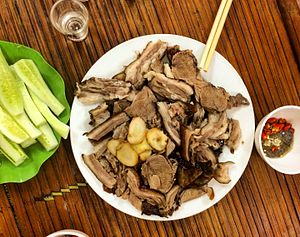
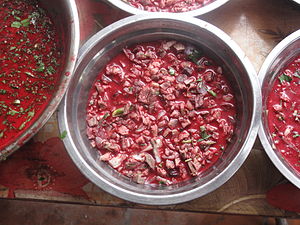
ほとんどの国では一般的ではない、あるいはタブーとされる食材の使用は、ベトナム料理を独特なものにする不可欠な特徴の一つである。多くの国では珍しい食材はエキゾチックなレストランでしか見られないが、ベトナム料理は、これらの食材の使用が社会階級に関わらず日常の家庭料理で慣習的な役割を果たすという点で、異例とみなされている。
あらゆる生鮮市場で見られる一般的で安価な朝食料理であるバロット(hột vịt lộn)は、ほぼ完全に発生した胚を含む孵化しかけのアヒルの卵で、殻ごと茹でて食べられる。通常、新鮮なハーブ(rau răm(ラウラム))、塩、黒胡椒と共に供され、入手可能であればライムジュースも人気のある添加物である。より珍しいバロット料理のバージョンであるウズラの胎児(trứng cút lộn)は、多くのベトナム人学生に好まれるおやつである。田んぼの蟹と田んぼのタニシは、人気の麺料理であるbún riêu ốcや、一部の日常的なスープ料理(canh)、煮込み料理(món bung)の主要な材料である。カイコ(nhộng)、バナナの花(hoa chuối)、スズメ、ハト、発酵させた魚やエビ(mắm cá、mắm tôm、mắm tép)を使った家庭料理は珍しくない。季節限定の人気料理にはゴカイ(rươi)があり、揚げたrươiオムレツ(チャールオイ)、発酵rươiソース(mắm rươi)、蒸しrươi(rươi hấp)、大根やタケノコとの炒め物(rươi xào củ niễng măng tươi hay củ cải)など、多くの料理が作られる。三本線のカニ(ba khía)は、カマウ、ソクチャン、バクリエウなどの南部数省で人気があり、発酵させたり、炒めたり、蒸したりして食べられる。
北部ベトナム料理は、その幅広い肉の選択肢でも注目に値する。犬肉、猫肉、ネズミ肉、ヘビ肉、スッポン、鹿肉、家畜ヤギなどの珍しい肉は、路傍のレストランで売られており、一般的にアルコール飲料と組み合わせられる。多くの西洋諸国やベトナム南部ではタブーとされている犬肉や猫肉の消費は、北部全域で一般的であり、男性の性欲を高めると信じられている。テレビシェフのアンドリュー・ジマーンは、自身の人気番組アンドリュー・ジマーンの奇妙な食べ物の第12話で北部ベトナムを訪れた。コブラの鼓動する心臓と乾燥骨、カイコ、雄牛のペニスは、彼が試食した料理の一部である。彼はヤマアラシも試した。
田んぼのネズミの肉(バーベキュー、煮込み、炒め物、または揚げ物)は、ベトナム南部の農村地域や高級都市レストランでも見られる珍味である。
ワニはベトナム人によって食べられていたが、中国人にとってはタブーで禁じられていた。
フカヒレはベトナムによって大量に輸入されている。
アンソニー・ボーディン、トラベル・チャンネルのアンソニー・ボーディン:ノー・リザベーションズのホストシェフは、2005年4月に「…すべてが使われ、ベトナムでは何も無駄にならない」と書いている。多くの西洋諸国ではしばしば処分される動物の部位も、ベトナム料理では完全に利用される。豚、牛、鶏の肺、肝臓、心臓、腸、膀胱などの臓器は、肉よりも高値で売られている。鶏の睾丸や未発達の卵は野菜と一緒に炒められ、日常の料理として供される。
Many of the traditional northern Lunar New Year dishes such as thịt đông, giò thủ, and canh măng móng giò involve the use of pig heads, tongues, throats and feet. Pig and beef tails, as well as chicken heads, necks and feet, are Vietnamese favorite beer dishes. Bóng bì, used as an ingredient in canh bóng—a kind of soup, is pig skin baked until popped. Steamed pig brains can be found almost everywhere. Also in the northern part of Vietnam, different kinds of animal blood can be made into a dish called tiết canh by whisking the blood with fish sauce and cold water in a shallow dish along with finely chopped, cooked duck innards (such as gizzards), sprinkled with crushed peanuts and chopped herbs such as Vietnamese coriander, mint, etc. It is then cooled until the blood coagulates into a soft, jelly-like mixture and served raw.
Coconut worms, or đuông dừa, is a delicacy found widely in the Trà Vinh province of Vietnam. They are the larvae form of the palm weevil and are eaten live within a salty fish sauce with chili peppers.
飲み物
ベトナムには、地元の特色を活かしたさまざまな飲み物がある。



| 名称 | 説明 |
|---|---|
| ジャスミンティー | ベトナムの地元の茶飲料。 |
| ビアホイ | 地元で少量生産されるベトナムのスペシャルティドラフトビール。 |
| カフェスアダー | 濃い深煎りアイスコーヒーで、カップの底に加糖練乳が入っており、かき混ぜて飲むのがベトナム人に非常に人気がある。 |
| カフェチュン | ベトナムエッグコーヒーと訳される飲み物だ。卵黄、ホイップクリーム、練乳、そしてもちろんエスプレッソを使用する。砂糖の代わりにバニラエッセンスや砂糖を使う場合もある。 |
| ヌオックミーア | サトウキビの茎を絞って抽出したジュース(柑橘系の風味を加えるためにキンカンを入れることもある)。氷を入れて提供される。 |
| Rau má | ツボクサの葉を水と砂糖と一緒に溶けるまでブレンドして作ったジュースで、ほぼ透明な緑色をしており、氷を入れて提供される。 |
| Sữa đậu nành | 温かいものと冷たいもの、甘いものと無糖のものがある大豆飲料。この飲み物はアジア諸国で非常に人気がある。しかし、ベトナムの豆乳が他のアジア諸国の豆乳と異なるのは、パンダンリーフを使用する点だ。パンダンリーフの使用はこの飲み物で非常に人気があるが、他の国では異なる甘味料を使用する。 |
| ルオウデー | 米から作られた蒸留酒。 |
| Trà đá | 安価で人気のあるアイスティーの一種で、薄いライムイエローの色をしており、通常あまり味がない。 |
| Trà đá chanh | レモンアイスティー。 |
| Chanh muối | 甘酸っぱい塩味のライムドリンク。 |
| Soda xí muội | 甘じょっぱい梅ソーダ。 |
| Soda hột gà | エッグソーダ。 |
| Sinh tố | 緑豆、小豆、アボカド、パイナップル、イチゴ、ジャックフルーツ、カスタードアップル、ドリアン、サポジラ、またはマンゴーと加糖練乳、砕いた氷で作られたベトナムのフルーツスムージー。 |
| Nước sắn dây hoa bưởi | クズとブンタンのフラワーエキスで作られている。 |
関連項目
参考資料
| この記事は、クリエイティブ・コモンズ・表示・継承ライセンス3.0のもとで公表されたウィキペディアの項目Vietnamese cuisine(23 May 2025, at 08:04編集記事参照)を翻訳して二次利用しています。 |
